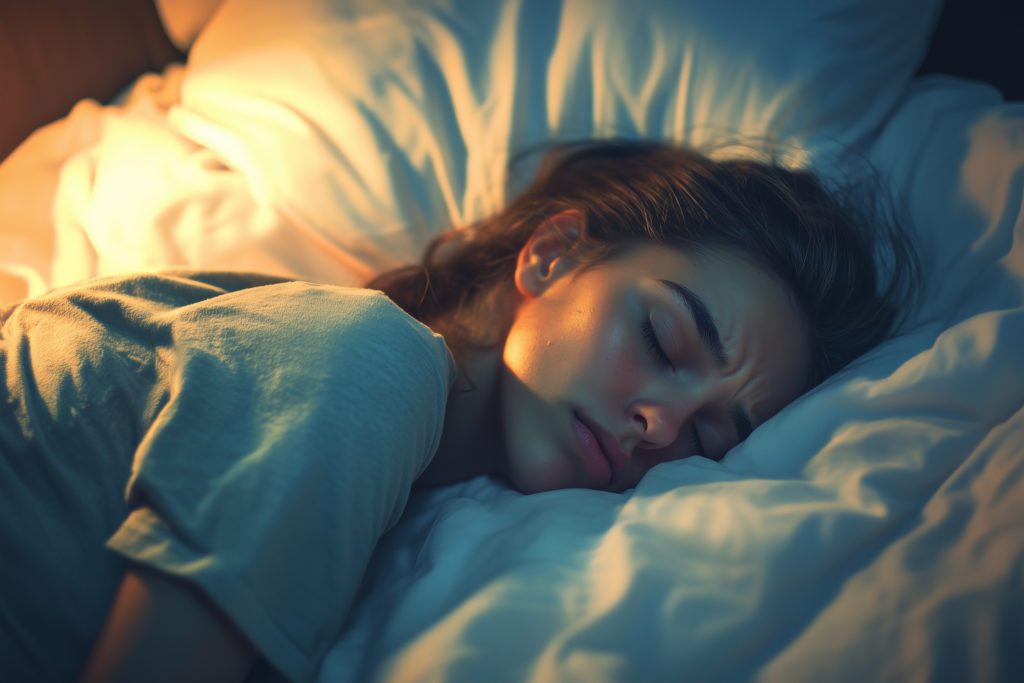
Adult Night Terrors: A Closer Look at This Disturbing Sleep Disorder
Adult night terrors can cause a person to bolt upright in bed, kicking and screaming. Stress and sleep deprivation can cause adult night terrors. Practicing good sleep hygiene can help prevent these attacks.

Night terrors are unexplained intense episodes of screaming, crying, flailing, kicking, or intense fear that occur when a person is sleeping. If you experience night terrors, you might wake up with your blankets strewn about the floor and wonder how they got there. A person who experiences night terrors may have little memory of them the next day.
Night terrors are classified as a parasomnia, which is a category of sleep disorders that involve unusual movements during sleep. Night terrors take place during the non-rapid eye movement (NREM) phase of sleep. This is the phase that occurs during the first part of the night. These movements can last up to 40 minutes.
Night terrors mostly affect children but are thought to occur in approximately two percent of adults in the United States. Experts believe that the number of adults with night terrors could be higher because most people don’t remember having them. If a person lives alone, they may not be aware of having night terrors.
In adults, night terrors are more likely to lead to injury. The person may lash out at a bed partner who tries to wake them up or injure themselves during a night terror by kitting or kicking something or even trying to run through a door.
Are Night Terrors the Same As Nightmares?
Night terrors are often mistaken for nightmares but they are different. Nightmares are intense dreams that provoke fear while night terrors are unusual movements that occur during sleep. Night terrors are not triggered by nightmares. Here are some ways in which you can tell the two apart:
- Different stages of sleep - Nightmares and night terrors don’t occur during the same stages of sleep. Nightmares take place during the later (REM) stage of sleep while night terrors typically occur in the early part of the night.
- Memory of the event - A person may be able to remember nightmares. In contrast, a person with night terrors will rarely remember these instances — even if they wake up during an episode.
- Incidence - 85 percent of adults have a nightmare once a year while less than three percent of adults experience night terrors.
What Causes Night Terrors in Adults?
Researchers can’t agree on a specific reason for night terrors. However, they seem to have a genetic basis. Some experts believe that night terrors occur because of a problem moving between various stages of sleep — specifically the NREM and REM stages. This is more likely to occur if you have experienced sleep deprivation.
Adults diagnosed with depression, bipolar disorder, anxiety and post-traumatic stress disorder (PTSD) are more likely to experience sleep terrors. There are a variety of things that can trigger night terrors including:
- Stress
- A sleep environment that is too bright or has too much noise
- Sleep apnea or other medical conditions that cause a person to wake up at night
- Alcohol
- Migraines
- Head injury
- Sleep deprivation or exhaustion
- Other sleep disorders
- Fever
- Head injury
Symptoms of Night Terrors
Night terrors may occur just a few times a year or pretty regularly. During a night terror episode, a person may:
- Scream or cry out
- Kick or thrash
- Sit up in bed and stare
- Have rapid, heavy breathing
- Be difficult to wake up
- Have a fast heart rate
- Have dilated pupils
- Appear to be panicked
- Have extreme fear
- Profusely sweat
The person’s eyes are usually open during these episodes but they usually don’t recall the attacks the next day. If you witness a loved one having a night terror, you should not try to wake them up or hold them back. People in night terror episodes can become combative.
How to Prevent Night Terrors
In adults, night terrors are rarely treated with medications. They may treat underlying conditions, such as migraines or sleep apnea. If you have night terrors frequently, your doctor may recommend changing your sleep environment to make it safer. This may involve moving things away from the bed that could hurt you if you are flailing around or kicking. In addition, there are some things that you can do to help prevent these attacks.
Practice Good Sleep Hygiene
Find a relaxing bedtime routine that you can do 60 minutes before bed. Do things that will help you unwind and prepare for sleep. This might involve listening to relaxing meditations or sleep sounds. Aim to get at least 8 hours of sleep a night. Keep a regular sleep routine with consistent wake-up and bedtimes. Use a tool like Pillow to help you with this.
Avoid Alcohol Before Bed
Since alcohol has been found to trigger night terrors, you’ll want to avoid it before bed. Aim to cut out alcohol use at least three hours before bed.
Manage Stress
Night terrors are often triggered by emotional tension. Stress is one of the most common triggers of these attacks. If you are experiencing a lot of anxiety, your physician may recommend that you see a therapist or mental health professional to help manage it.
Limit Caffeine
Large amounts of caffeine can trigger night terrors if you drink it within five hours of bedtime. Caffeine can also interfere with your sleep cycle making it difficult to fall and stay asleep. When you don’t sleep well, you are more likely to have a night terror. So, replace your coffee with a warm herbal tea instead.
Minimize Sleep Disruptions
Anything that disrupts sleep increases the risk of night terrors. Avoid playing music while you sleep or leaving the TV on — even if you have it set on a timer. Use blackout curtains to minimize noise from outdoors.
When To See a Doctor
When they occur often, night terrors can result in disturbed sleep, both for you and your loved ones. They can also cause you to feel sleepy during the day. Kicking and flailing about during night terrors can result in injuries. If night terrors are interfering with your sleep quality, making you feel tired during the day, or causing you to injure yourself or others, then it’s time to see a doctor. Your doctor will discuss your symptoms, do a physical exam, and may refer you to a sleep specialist for an overnight sleep study and further evaluation and treatment.

Written by
Emily Mendez
Emily Mendez is a former therapist and mental health author. She is one of the leading voices in mental health. Emily's writing has appeared in eCounseling, SonderMind, and more. Emily is frequently interviewed by Healthline, Fatherly, INSIDER, Family Circle, and other national media for her advice and expert opinion on the latest mental health topics.
Download Pillow
Get help
Press & News
Legal
Connect
X (Twitter)
Company
Copyright © Neybox Digital Ltd.


